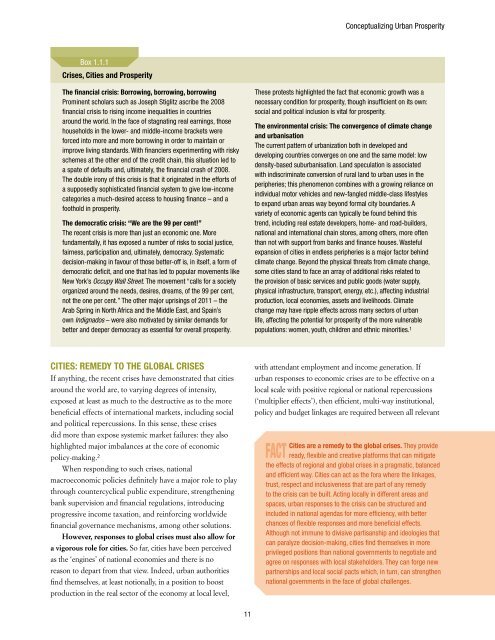state of the world's cities 2012/2013 - United Nations Sustainable ...
state of the world's cities 2012/2013 - United Nations Sustainable ...
state of the world's cities 2012/2013 - United Nations Sustainable ...
You also want an ePaper? Increase the reach of your titles
YUMPU automatically turns print PDFs into web optimized ePapers that Google loves.
Conceptualizing Urban ProsperityBox 1.1.1Crises, Cities and ProsperityThe financial crisis: Borrowing, borrowing, borrowingProminent scholars such as Joseph Stiglitz ascribe <strong>the</strong> 2008financial crisis to rising income inequalities in countriesaround <strong>the</strong> world. In <strong>the</strong> face <strong>of</strong> stagnating real earnings, thosehouseholds in <strong>the</strong> lower- and middle-income brackets wereforced into more and more borrowing in order to maintain orimprove living standards. With financiers experimenting with riskyschemes at <strong>the</strong> o<strong>the</strong>r end <strong>of</strong> <strong>the</strong> credit chain, this situation led toa spate <strong>of</strong> defaults and, ultimately, <strong>the</strong> financial crash <strong>of</strong> 2008.The double irony <strong>of</strong> this crisis is that it originated in <strong>the</strong> efforts <strong>of</strong>a supposedly sophisticated financial system to give low-incomecategories a much-desired access to housing finance – and afoothold in prosperity.The democratic crisis: “We are <strong>the</strong> 99 per cent!”The recent crisis is more than just an economic one. Morefundamentally, it has exposed a number <strong>of</strong> risks to social justice,fairness, participation and, ultimately, democracy. Systematicdecision-making in favour <strong>of</strong> those better-<strong>of</strong>f is, in itself, a form <strong>of</strong>democratic deficit, and one that has led to popular movements likeNew York’s Occupy Wall Street. The movement “calls for a societyorganized around <strong>the</strong> needs, desires, dreams, <strong>of</strong> <strong>the</strong> 99 per cent,not <strong>the</strong> one per cent.” The o<strong>the</strong>r major uprisings <strong>of</strong> 2011 – <strong>the</strong>Arab Spring in North Africa and <strong>the</strong> Middle East, and Spain’sown Indignados – were also motivated by similar demands forbetter and deeper democracy as essential for overall prosperity.These protests highlighted <strong>the</strong> fact that economic growth was anecessary condition for prosperity, though insufficient on its own:social and political inclusion is vital for prosperity.The environmental crisis: The convergence <strong>of</strong> climate changeand urbanisationThe current pattern <strong>of</strong> urbanization both in developed anddeveloping countries converges on one and <strong>the</strong> same model: lowdensity-based suburbanisation. Land speculation is associatedwith indiscriminate conversion <strong>of</strong> rural land to urban uses in <strong>the</strong>peripheries; this phenomenon combines with a growing reliance onindividual motor vehicles and new-fangled middle-class lifestylesto expand urban areas way beyond formal city boundaries. Avariety <strong>of</strong> economic agents can typically be found behind thistrend, including real e<strong>state</strong> developers, home- and road-builders,national and international chain stores, among o<strong>the</strong>rs, more <strong>of</strong>tenthan not with support from banks and finance houses. Wastefulexpansion <strong>of</strong> <strong>cities</strong> in endless peripheries is a major factor behindclimate change. Beyond <strong>the</strong> physical threats from climate change,some <strong>cities</strong> stand to face an array <strong>of</strong> additional risks related to<strong>the</strong> provision <strong>of</strong> basic services and public goods (water supply,physical infrastructure, transport, energy, etc.), affecting industrialproduction, local economies, assets and livelihoods. Climatechange may have ripple effects across many sectors <strong>of</strong> urbanlife, affecting <strong>the</strong> potential for prosperity <strong>of</strong> <strong>the</strong> more vulnerablepopulations: women, youth, children and ethnic minorities. 1Cities: Remedy to <strong>the</strong> Global CrisesIf anything, <strong>the</strong> recent crises have demonstrated that <strong>cities</strong>around <strong>the</strong> world are, to varying degrees <strong>of</strong> intensity,exposed at least as much to <strong>the</strong> destructive as to <strong>the</strong> morebeneficial effects <strong>of</strong> international markets, including socialand political repercussions. In this sense, <strong>the</strong>se crisesdid more than expose systemic market failures: <strong>the</strong>y alsohighlighted major imbalances at <strong>the</strong> core <strong>of</strong> economicpolicy-making. 2When responding to such crises, nationalmacroeconomic policies definitely have a major role to playthrough countercyclical public expenditure, streng<strong>the</strong>ningbank supervision and financial regulations, introducingprogressive income taxation, and reinforcing worldwidefinancial governance mechanisms, among o<strong>the</strong>r solutions.However, responses to global crises must also allow fora vigorous role for <strong>cities</strong>. So far, <strong>cities</strong> have been perceivedas <strong>the</strong> ‘engines’ <strong>of</strong> national economies and <strong>the</strong>re is noreason to depart from that view. Indeed, urban authoritiesfind <strong>the</strong>mselves, at least notionally, in a position to boostproduction in <strong>the</strong> real sector <strong>of</strong> <strong>the</strong> economy at local level,with attendant employment and income generation. Ifurban responses to economic crises are to be effective on alocal scale with positive regional or national repercussions(‘multiplier effects’), <strong>the</strong>n efficient, multi-way institutional,policy and budget linkages are required between all relevantFACTCities are a remedy to <strong>the</strong> global crises. They provideready, flexible and creative platforms that can mitigate<strong>the</strong> effects <strong>of</strong> regional and global crises in a pragmatic, balancedand efficient way. Cities can act as <strong>the</strong> fora where <strong>the</strong> linkages,trust, respect and inclusiveness that are part <strong>of</strong> any remedyto <strong>the</strong> crisis can be built. Acting locally in different areas andspaces, urban responses to <strong>the</strong> crisis can be structured andincluded in national agendas for more efficiency, with betterchances <strong>of</strong> flexible responses and more beneficial effects.Although not immune to divisive partisanship and ideologies thatcan paralyze decision-making, <strong>cities</strong> find <strong>the</strong>mselves in moreprivileged positions than national governments to negotiate andagree on responses with local stakeholders. They can forge newpartnerships and local social pacts which, in turn, can streng<strong>the</strong>nnational governments in <strong>the</strong> face <strong>of</strong> global challenges.11





